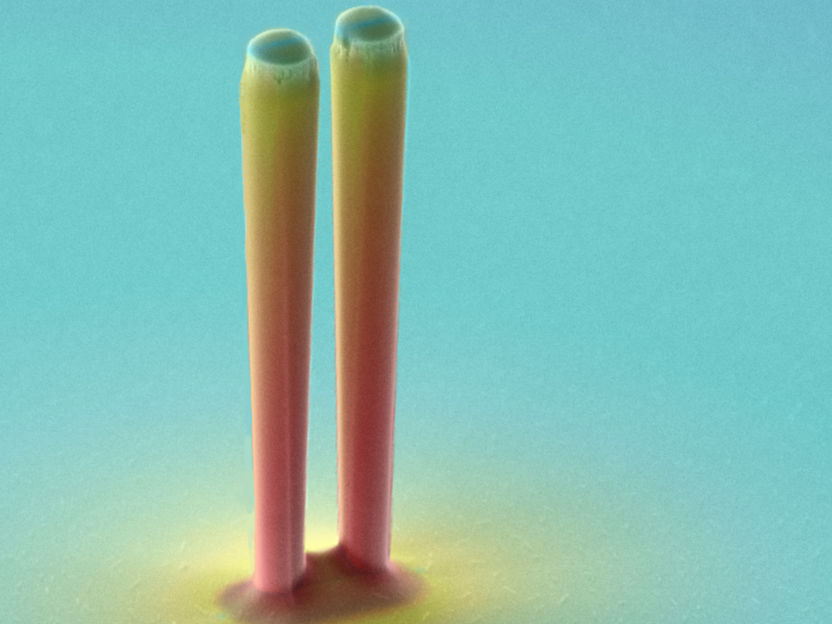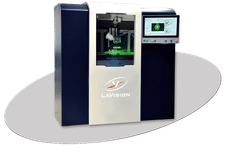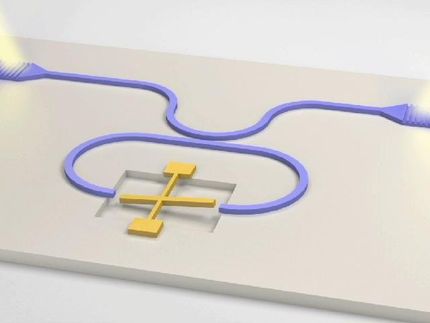Directly coupling two closely located nanoscale sensors
Coupled oscillations
They look like toothpicks, but much, much smaller: 10,000 times shorter and 1,000 times thinner. The research team around physicist Professor Eva Weig succeeded in constructing nanopillars so closely together that they can be coupled via the strain field and succinctly oscillate together. This technique makes it possible to envisage whole fields of such resonators, which in turn can be used as sensors or impulse generators with application options in quantum technology. The experiments are described in the open access journal Nature Communications.

Strain field of two nanopillar resonators for the mechanical coupling of nanopillars.
AG Weig
Coupling between nanomechanical resonators currently is a popular research field, as they oscillate better collectively than solo in certain respects. In contrast to set-ups that require induced fields to achieve a coupling effect, the nanopillar resonators of the Nanomechanics group from Konstanz produce a direct, mechancial coupling. The key here is that the pillars have to be anchored closely enough to each other. If one nanopillar is set in motion, the surrounding ground distorts. This distortion has a certain range and consequently the neighbouring pillar “senses” this and also oscillates. “The coupling is very strong if the pillars are close enough”, says Eva Weig.
Advantage: Large pillar fields a possibility
“Our system has the advantage that it will be easy to establish large fields with many pillars”, says doctoral researcher and co-author Juliane Doster. As the pillars’ oscillation amplitudes are so large that they can even be seen under a microscope, it is possible to directly observe what happens in such a field of pillars. The Nanomechanics group used the semiconductor gallium arsenide for their nanopillars, but actually all semiconductors would be suitable. “You simply need to know how to etch the pillars from the material”, says Juliane Doster.
Outlook: Coupled pillar fields
Additional functions could also be included in the resonator fields. “Even though our pillars have not been functionalized yet, our results might lead the path to realizing whole networks of such functionalized nanopillars in the future”, says Eva Weig. Several single-photon sources may be synchronized this way, for example, for applications in quantum information processing. Another possible application would not even require functionalization: Coupled pillar fields might be used to transport acoustic signals without loss in some kind of “one-way street for sound waves”.
Original publication
Other news from the department science
These products might interest you

SprayMaster inspex by LaVision
Quality Control for Your Spraying Process Through Digital Spray and Particle Analysis
Reliable, Automated, Digital - The Geometry Measurement of Your Spraying Process in Real Time

FireSting-PRO by PyroScience
New fiber optic measuring device: Precise measurements even in the smallest volumes
Measure pH, oxygen and temperature even under sterile conditions

VEGAPULS | VEGABAR | VEGASWING by VEGA Grieshaber
Cyber-safe level measurement - here's how it works
Find out more about the unique sensor for liquid and solid media

Get the chemical industry in your inbox
By submitting this form you agree that LUMITOS AG will send you the newsletter(s) selected above by email. Your data will not be passed on to third parties. Your data will be stored and processed in accordance with our data protection regulations. LUMITOS may contact you by email for the purpose of advertising or market and opinion surveys. You can revoke your consent at any time without giving reasons to LUMITOS AG, Ernst-Augustin-Str. 2, 12489 Berlin, Germany or by e-mail at revoke@lumitos.com with effect for the future. In addition, each email contains a link to unsubscribe from the corresponding newsletter.
Most read news
More news from our other portals
See the theme worlds for related content
Topic world Sensor technology
Sensor technology has revolutionized the chemical industry by providing accurate, timely and reliable data across a wide range of processes. From monitoring critical parameters in production lines to early detection of potential malfunctions or hazards, sensors are the silent sentinels that ensure quality, efficiency and safety.

Topic world Sensor technology
Sensor technology has revolutionized the chemical industry by providing accurate, timely and reliable data across a wide range of processes. From monitoring critical parameters in production lines to early detection of potential malfunctions or hazards, sensors are the silent sentinels that ensure quality, efficiency and safety.
Topic World Chromatography
Chromatography enables us to separate, identify and thus understand complex substances. Whether in the food industry, pharmaceutical research or environmental analysis - chromatography opens up a treasure trove of information about the composition and quality of our samples. Discover the fascinating world of chromatography!

Topic World Chromatography
Chromatography enables us to separate, identify and thus understand complex substances. Whether in the food industry, pharmaceutical research or environmental analysis - chromatography opens up a treasure trove of information about the composition and quality of our samples. Discover the fascinating world of chromatography!
Last viewed contents
John_Boot
Chalk_Emerald




























































